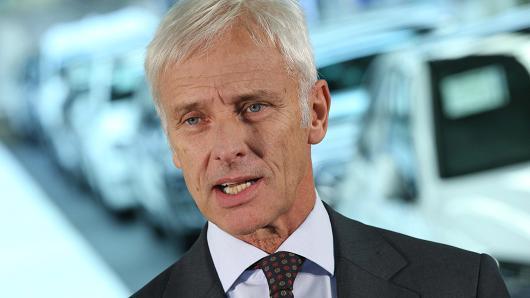
Photo: On October 21, 2015, in Wolfsburg, Germany, Matthias Mueller, Chairman of the Volkswagen Group, Bernd Osterloh, Chairman of Volkswagen's Working Committee, and Stephan Weil, Governor of Lower Saxony, addressed the media before a tour of the Volkswagen factory.
On September 12, CNBC reported that Volkswagen is making a major shift toward electric vehicles, planning to invest $24 billion by 2030 to develop zero-emission models and compete with Tesla’s growing influence. The company aims to launch 80 new electric models across its brands by 2025—far exceeding the previous target of 30—and aspires to offer 300 electric models by 2030. This bold move reflects a strategic transformation driven by both environmental concerns and market competition.
Volkswagen had previously committed over $12 billion to electric vehicle R&D by 2025. However, the "Dieselgate" scandal, which exposed emissions cheating in the U.S., delayed progress on electric and autonomous technologies. Despite this setback, the scandal forced the company to rethink its future and accelerate its transition to sustainable mobility. With global pressure increasing due to stricter emissions regulations and rising public awareness of climate change, automakers are now under more pressure than ever to innovate and reduce their carbon footprint.
At the Frankfurt Motor Show, Matthias Mueller, then CEO of Volkswagen, emphasized the company’s ambition: “We must be at the forefront, not chasing Others.†He unveiled the company’s detailed “electric car roadmap,†stating, “We are setting the stage for the final breakthrough in motor dynamics.†The ID series, Volkswagen’s new electric lineup, is designed to directly compete with Tesla’s Model 3, offering an affordable option for mass-market consumers.
Other German automakers are also accelerating their electric strategies. Daimler announced that all Mercedes-Benz models will be electrified by 2022, though it warned that transitioning to low-margin electric vehicles will require cost-cutting measures. BMW launched the i3 in 2013 and plans to mass-produce electric cars by 2020, aiming to release 12 fully electric models by 2025.
Government policies targeting diesel and gasoline vehicles are pushing the automotive industry toward electrification. However, experts warn that large-scale investments in charging infrastructure and power grids are essential to support the growing demand. China, the world’s largest auto market, is considering when to phase out fuel vehicles, following similar moves by the UK and France, which have set 2040 as the deadline for banning traditional cars.
To meet the demands of its electric vehicle strategy, Volkswagen has started searching for partners in China, Europe, and North America to secure battery supplies worth over $60 billion. In January, Tesla began large-scale production at its Nevada Gigafactory, aiming to produce 35 billion watt-hours of batteries annually. Volkswagen believes it will need at least four such facilities to meet the expected surge in electric vehicle demand.
In a recent interview with Reuters, Müller stated that the company doesn’t need to sell assets to fund its electric vehicle program. He added, “Although we faced financial losses from the Dieselgate scandal, we have no issues with these investments.†Volkswagen is developing a new MEB platform, which will serve as the foundation for its mass-market electric vehicles. The first model based on this platform, a compact car similar to the Golf, is expected to launch in 2020 with a range of approximately 600 kilometers.
DC stepper motor,DC synchronous motor,BLDC synchronous motor
YIWU JINGHONG AUTO PARTS CO.,LTD , https://en.jhauto.ru